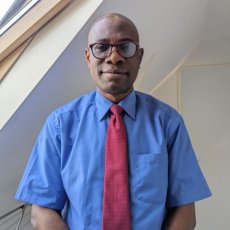
Student Ambassador Olufemi Alade
My decision to study theology abroad came from a personal desire to pursue a foreign education—one that would challenge and expand my worldview. I was particularly drawn to the Protestant Theological University (PThU) because of its interdisciplinary approach to theology. I wanted to understand how faith, creation and its intrinsic values, and ethics interact in shaping a sustainable ecosystem.
At the PThU, I’ve found a rich academic environment that encourages critical thinking and dialogue. Studying alongside people from different cultures has deepened my understanding of dignity and ethics in a global context.
A supportive and enriching academic experience
My studies at PThU have been intellectually demanding, but also personally enriching. The small class sizes and accessible professors create a very supportive learning environment. I’ve especially appreciated how theology here is not treated as something static but as a space for practical reflection and engagement.
Living in the Netherlands has added another dimension to my education. Being part of a multicultural community has shaped the way I think and engage with theology. It’s not only about studying texts—it’s about applying what we learn in real-life contexts.
Theological themes that matter to me
Some of the topics that have really captured my attention are “Overcoming Slavery and Racism” and “The Spirit as Guide” (with a focus on Pneumatology). Through these courses, I’ve explored the meaning of human dignity and the role of the Holy Spirit across different theological and cultural landscapes.
These subjects align with my advocacy for justice and inclusivity. They’ve given me new perspectives and practical tools I hope to apply back home in Nigeria.
Lessons from life abroad
One of the unexpected things I’ve learned in my studies is the importance of dialogue and critical inquiry. Rather than providing final answers, theology at PThU invites ongoing conversation. That has shifted how I approach both academic and spiritual questions.
Living in the Netherlands has also taught me a lot about cultural differences. For example, the Dutch approach to time and their direct way of communicating were a bit of a cultural shock at first. But I’ve learned to adapt and to value the honesty and structure these traits bring. I’ve also grown in my appreciation for diversity, both in daily life and academic settings.
What I’ll take home
My perspective has changed in many ways—academically, culturally, and personally. I’ll return home with a deeper understanding of the value of dialogue and cooperation in facing ethical challenges. I also carry with me the lessons from cultural exchange and adaptability that came from living abroad.
For anyone considering theological studies abroad, I encourage you to look at PThU. It offers a space where theology is lived, shared, and shaped together with others from all over the world.
